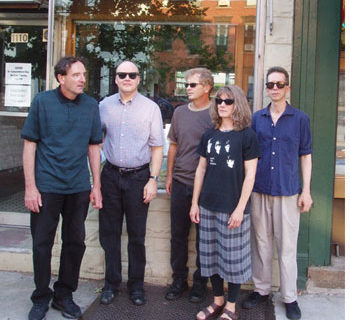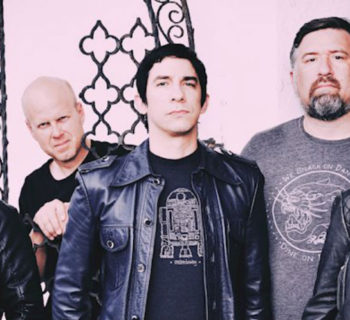It’s not often that an artist’s debut album is as sonically mature as Tim Muddiman and the Strange’s Paradise Runs Deeper, but Tim Muddiman isn’t your typical fledgling artist.
Though Paradise Runs Deeper is functionally a debut, the British multi-instrumentalist and producer has worked extensively with Gary Numan, Pop Will Eat Itself, and Nine Inch Nails as part of their touring bands and a supporting act. In fact, the production and musical architecture on the album share similarities to those aforementioned artists with its massive, arena-worthy percussion and electro flourishes, but with a greater focus on guitar work than synthesizers. Indeed, the guitar work, both in tone and phrasing, is the most exciting element of the album. The immediate artistic comparison is Jack White by way of Johnny Marr.
It’s these angular, distorted guitars, along with industrial drums, that kick off the album on “Bullet Stroke”—a dark and grandiose song that sets the tone and pace for the whole affair. Unfortunately, the album deviates very little from the precedent set here. “Glass Queen” continues the mired tempo and atmosphere, but with reverb-laden and distorted open-sustain guitar, reminiscent of Chris Isaak’s “Wicked Game.” On “Rolling Stones,” Muddiman shifts between Far-East-sounding scales in the intro and verse riffs and heavy blues scales for several solos, making the track just interesting enough to overshadow the stale cadence.
The album takes a turn and dazzles with “Strangers,” which begins with tribal drums that give way to electro beats reeking of “Closer”-era Nine Inch Nails or Ministry. The guitar work here continues to impress and has a comparable feel to St. Vincent’s “Digital Witness” with its dizzying marriage of analog and digital instrumentation. Another highlight, “Oversea – Underworld,” finally switches up the tempo with a rockabilly/punk influence felt in the bass and guitar tones, riffs, and movement. It still retains most of the overarching gothic aesthetic found throughout the album, but gives the listener a much needed dose of variation. It’s a shame it comes so late in the game.
None of the album sounds particularly “strange,” however, especially compared to the current crop of darkwave bands treading similar waters, such as Cold Cave and TR/ST. But that’s not the type of “strange” Muddiman intended, explaining in an interview with Gigslutz:
‘The Strange’ isn’t really to do with the music . . . the reason why I bolted the word ‘strange’ on to my name is because the ‘strange’ is the band, the ‘strange’ is the videos we make, it’s our management and it’s our friends. It just gives me an option to do whatever the fuck I want so I don’t feel pigeon-holed. I never want to be pigeon-holed.
Tim Muddiman’s devil-may-care, individualistic sentiment here is admirable, but never seems realized in terms of the songwriting. Instead, it feels like a major studio album, accompanied by many of the trappings associated with mainstream rock music.
Indeed, the guitar work, both in tone and phrasing, is the most exciting element of the album. The immediate artistic comparison is Jack White by way of Johnny Marr.
Another major shortcoming of the album are the pedestrian lyrics found on multiple tracks, many of them sounding like an angsty teen’s songbook or diary. “Rolling Stones,” “Hands and Claws,” and “Wildwood Stone” are perhaps the biggest lyrical offenders. On the first, Muddiman sings “Until we’re down and gone alone / Forever rolling stones.” “Hands and Claws” finds Muddiman shouting clichés like “between the devil and the deep blue sea” before launching into the refrain, “there will always be another, another drunk lover.” “Wildwood Stone” has perhaps the most laughably trite chorus with Muddiman pleading to a lover “please don’t go.”
This isn’t to say that the lyrics aren’t catchy—quite the opposite actually—these songs have a way of getting stuck in your head. Tim Muddiman’s songs would benefit from some serious study of the late Leonard Cohen to capture that intersection of earworm poppiness and profundity. If anything, Muddiman needs to focus more on images and storytelling over romantic philosophizing.
In the end, Paradise Runs Deeper showcases a wonderfully talented musician in Tim Muddiman with a distinct sound and ambiance, but it’s ultimately too repetitive in pacing, rhythm, and lyrics to fully recommend. Muddiman is at his best when he surprises and ditches the blueprint laid out in the early tracks of the album. Hopefully, he can weird (née strange) things up on his next effort and fulfill all of the promise found on this debut.













